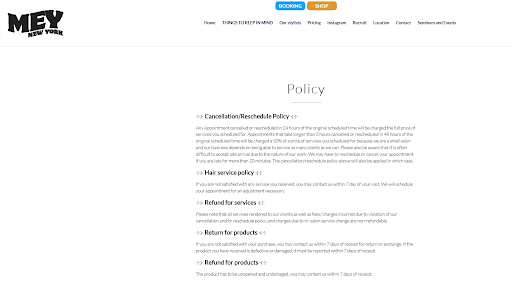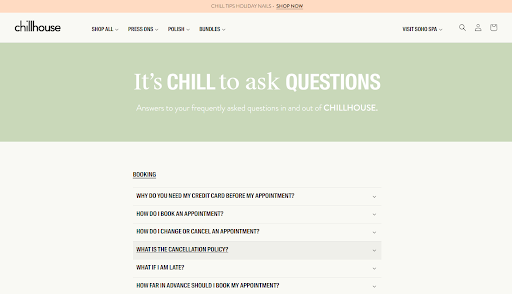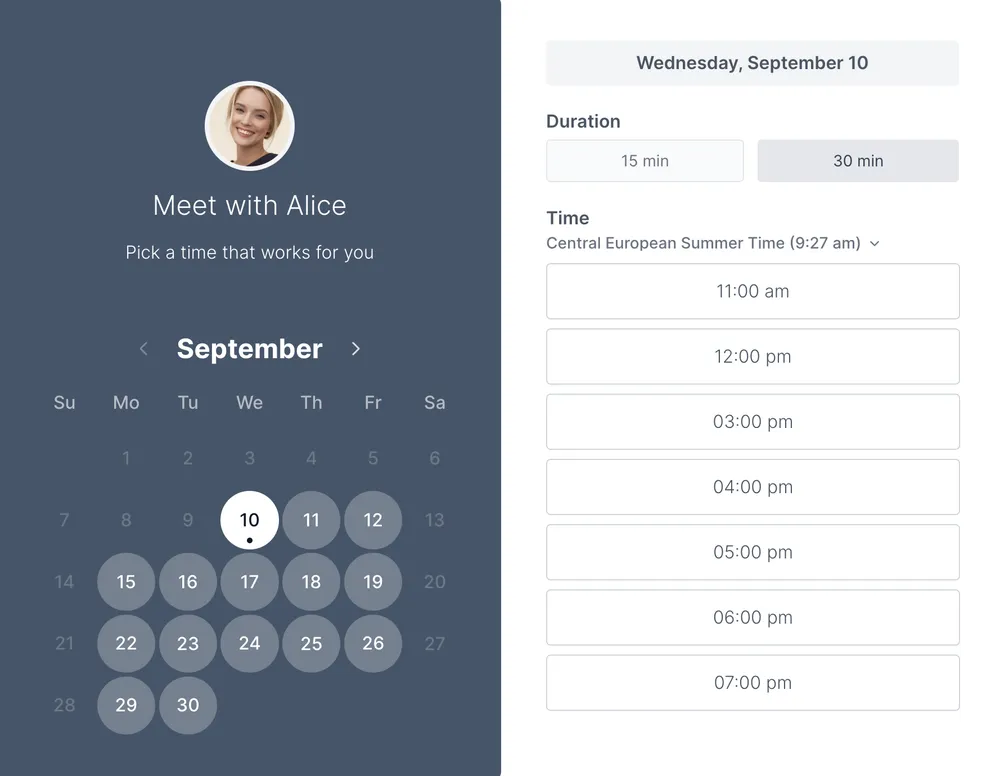For a beauty salon, hairdressing studio, nail bar, or spa, delivering exceptional service is just the beginning. To truly thrive, you must also tackle one of the industry’s biggest challenges: last-minute cancellations and no-shows. In other words, managing time effectively and minimizing revenue loss are just as critical to success as the services themselves.
That’s where a clear and well-communicated beauty salon cancellation policy can help. It protects your business, reduces empty appointment slots, and sets healthy boundaries with clients. The good news? You don’t have to start from scratch. In this article, you’ll find free salon cancellation policy templates, examples of best practices, and tips on how to communicate and enforce your policy smoothly.

Why a salon cancellation policy is essential
Every appointment on your calendar represents more than just a time slot: it’s preparation, staffing, and potential revenue. When a client cancels at the last minute or doesn’t show up at all, it can throw off your entire day, leaving your team with unexpected gaps and lost income. In fact, industry-sources suggest that salons may lose tens of thousands of dollars annually due to last-minute cancellations and no-shows.
That’s why having a clear, well-communicated salon cancellation policy isn’t just a formality; it’s a way to protect your business while maintaining healthy, respectful relationships with your clients. A good policy sets expectations early, removes awkward conversations, and ensures everyone understands how cancellations are handled.
Here’s how a well-structured policy can transform your day-to-day operations:
· Reduces last-minute cancellations and no-shows
· Protects your team’s time and productivity
· Stabilizes cash flow with deposit or cancellation fee structures
· Creates fairness and accountability for all clients
· Improves scheduling efficiency and staff planning
· Prevents disputes by setting expectations upfront
Think about it this way: If clients understand your salon late-cancel and no-show policy clearly (before they book) they’re more likely to respect your time.
Key elements of a salon cancellation policy document
Writing your own beauty salon policies and procedures can feel a little intimidating, and that’s completely understandable. It’s more than just a set of rules, it’s a legal agreement, a reflection of your salon’s values, and something that shapes the way clients experience your business. The way it’s written can influence how confident you feel enforcing it and how clients perceive your professionalism.
On the plus side, a strong policy doesn’t need to be complicated. By focusing on a few clear, thoughtful elements, you can create something that protects your time, supports your team, and maintains a warm, trusting relationship with your clients. Let’s dive in!
Notice period and cancellation fees
The notice period defines how far in advance a client must cancel or reschedule without being charged a cancellation fee.
Common examples:
- 24-hour notice for standard appointments
- 48-hour notice for color, extensions, or multi-service bookings
- 72-hour notice for weddings, group bookings, or high-value treatments
If a client cancels after the notice window, or doesn’t show up, you can charge a percentage of the service cost or retain their deposit. Below is a summary table with an example of notice period and cancellation fees by service type. Typical prices are based on average U.S salon rates and can be adjusted according to your location and clientele.
| Service Type | Example Services | Notice Period | Suggested Cancellation Fee | Typical Price Range* |
| Standard appointments | Haircuts, blowouts, manicures | 24 hours | 30–50% of the service price | $40–$100 |
| Color, extensions, or multi-service bookings | Highlights, balayage, hair extensions, spa packages | 48 hours | 50–75% of the service price | $150–$400 |
| Weddings, group bookings, high-value treatments | Bridal hair & makeup, group spa days, full transformations | 72 hours | 75–100% of the service price (or full deposit) | $500+ |
Benefits of clear notice periods:
- Gives you time to offer the slot to someone else (via wait-list management for cancellations)
- Encourages clients to plan responsibly
- Reduces staff idle time
Tip: With smart scheduling tools like Koalendar for the beauty industry, you can send reminders, and enforce your fee policy without awkward conversations.
Payment collection terms including deposits and booking fees
Many salons reduce cancellations by requiring deposits or pre-payments at the time of booking.
Examples of deposit policies:
- 20–50% deposit for regular appointments
- 100% for special packages or peak hours
- Non-refundable for no-shows or late cancellations
Deposits not only protect your business, they also create higher client accountability and encourage clients to show up.
“We started doing this in January… any new client that is having any chemical treatment has to pay a deposit. … We have almost no no-shows now. We’ve got rid of all the time-wasters who would book and not turn up.”
— Anita Clements, owner of Twisted Desire Hair & Beauty
Additional resource: If you want to learn more about how to make money and keep your customers happy with deposit implementation, check out the full webinar covering Anita’s experience below
Right to refuse service due to health or safety risk
Your salon is a place where people come to feel their best, and that starts with protecting everyone’s wellbeing. That’s why it’s important for your cancellation policy to include a clear statement about your right to refuse service in situations that pose a health or safety risk.
For example, during the height of the COVID-19 pandemic, many salons had to turn away clients who showed up with symptoms of illness, had recent exposure, or didn’t comply with health guidelines. Even today, this clause remains relevant, whether it’s flu season, a contagious skin condition, or any situation that could put others at risk.
Your salon policy document should also cover circumstances in which you reserve the right to refuse service. This may include:
- Clients showing symptoms of contagious illness.
- Unsafe or aggressive behavior.
- Hygiene or health and safety violations.
Example policy text:
“We reserve the right to refuse service to anyone showing signs of contagious illness (including cold, flu, or COVID-19), or engaging in behavior that compromises the safety of our team or clients. If you’re feeling unwell, we kindly ask that you reschedule your appointment as soon as possible.”
Including this in your policy helps set expectations upfront. It also gives your team the confidence to make health-driven decisions without hesitation, protecting both your business and your community.
Handling late arrivals and appointment time management
Even when clients intend to show up, late arrivals can throw off your entire day. A 10-minute delay in the morning can snowball into a fully backed-up schedule, rushed services, and unhappy clients later in the day. That’s why a clear policy around late arrivals is just as important as your cancellation terms.
A good late-arrival policy should define exactly how much leeway clients have before their appointment is affected, and what happens if they arrive after that window. Many salons offer a 10–15 minute grace period, after which the appointment may be shortened or marked as a no-show, depending on the service type and schedule flexibility.
It’s also smart to explain how late arrivals impact service quality. For example, a color treatment may require the full appointment time to process correctly, while a simple trim might still be possible if shortened. Setting that expectation early prevents awkward conversations at the front desk.
Common salon policies for late arrivals:
- A 10–15 minute grace period
- Shortening the service if a client arrives late
- Considering the appointment a no-show after 15 minutes
Example policy text:
“We understand that unexpected delays can happen. However, arriving more than 10 minutes late may result in a shortened service or the need to reschedule. Arrivals beyond 15 minutes may be considered a no-show and subject to our cancellation policy.”
Pro tip: Pairing this policy with automated reminders and clear appointment confirmations can significantly reduce late arrivals. A quick text or email reminder on the day of the appointment often makes the difference between a smooth schedule and a stressful day of back-to-back delays.

By communicating this clearly (on your website, in reminders, and at the time of booking) you’re protecting your team’s time, keeping the day on track, and ensuring every client gets the care and attention they deserve.

Free salon cancellation policy templates
To make things easy, here are ready-to-use salon cancellation policy templates that you can copy and adapt for your business.
Each one includes clear terms, client-friendly language, and room for customization.
1. 24-Hour Notice Policy Template
A 24-hour cancellation policy is the most common and flexible option.
Why it works:
- Balances client flexibility with your need for predictability
- Gives enough time to fill last-minute gaps
- Reduces staff idle time
24 hours’ notice template:
“We kindly ask for at least 24 hours’ notice to cancel or reschedule your appointment. Cancellations made with less than 24 hours’ notice will result in a 50% cancellation fee. No-shows will be charged the full service amount. Thank you for respecting our time and helping us serve all our clients efficiently.”
Benefits of this template:
- Encourages accountability
- Simple to communicate
- Works for most standard salon services
2. Deposit-Based Policy Template
For high-demand services or premium bookings, like Anita’s example above with chemical treatments, a deposit-based salon cancellation policy can be more effective.
Why it works:
- Reduces last-minute cancellations dramatically
- Protects revenue from high-value bookings
- Sets clear expectations from the start
Deposit template:
“To secure your appointment, we require a 50% deposit at the time of booking. This deposit is non-refundable for cancellations made less than 24 hours before your appointment or for no-shows. Rescheduling is free if done within the 24-hour notice period.”
Pro tip: With automated deposit collection through your salon booking software, you can make this process seamless.
3. Tiered policy for multiple services or group bookings
Some services require more time and staff so they should have different cancellation terms. A tiered salon cancellation fee policy allows flexibility while protecting your business.
Why it works:
- Reflects the value of different services.
- Covers multi-hour or team bookings (e.g., bridal hair, spa packages).
- Encourages early communication from clients.
Tiered policy template:
“Cancellations for standard services require 24 hours’ notice. Group bookings and multi-service appointments require 48 hours’ notice. Late cancellations will incur a 50% fee, and no-shows will be charged 100% of the service cost.”
4. No-show policy template
No-shows can be the most damaging to your schedule. A no-show policy ensures clients understand the consequences of not showing up.
Why it works:
- Protects your revenue from total loss
- Deters repeat offenders
- Ensures fair scheduling for everyone
No-show template:
“If a client does not show up for their appointment and fails to notify us in advance, they will be charged the full service fee. Repeat no-shows may be required to prepay future appointments or may lose booking privileges.”
Pro tip: Use wait-list management for cancellations to fill these empty slots quickly.
5. Flexible policies for unforeseen events
While firmness is key, a good salon cancellation policy for clients and bookings should also include a grace clause for genuine emergencies.
Why it works:
- Shows empathy and builds client trust
- Prevents negative client reactions to cancellation fees
- Maintains long-term relationships
Unforeseen events template:
“We understand that life happens. If you experience an emergency or sudden illness, please contact us as soon as possible. Exceptions to our cancellation policy may be made at our discretion.”
Here’s a sample salon policies and procedures document you can adapt:
[Salon Name] Appointment & Cancellation Policy
Welcome to [Salon Name]! To ensure the best experience for all our guests and our team, please review our salon policies:
- Booking & Deposits All appointments must be booked online or through our front desk. A deposit of [X]% is required for all services over $[amount].
- Cancellations We require at least 24 hours’ notice for standard appointments and 48 hours’ notice for group or specialty services. Cancellations within the notice period may be subject to a 50% cancellation fee. No-shows will be charged the full amount.
- Late Arrivals We offer a 10-minute grace period. After this, your appointment may be shortened or canceled. No-shows apply after 15 minutes.
- Rescheduling You may reschedule through our online booking portal up to the cancellation window without penalty.
- Health & Safety We reserve the right to refuse service to anyone exhibiting symptoms of illness or unsafe behavior. Please inform us in advance if you are unwell.
- Communication Clients will receive appointment confirmations and reminders via email and/or SMS. By booking, you agree to these policies.
Download the complete salon policy template here
How to communicate and enforce your policy
A great policy is only effective if your clients know about it and understand it. Here are some best practices to communicate and enforce your salon cancellation policy document clearly and professionally.
Display the policy everywhere
- Add it to your website (booking page, FAQ, Terms & Conditions)
- Post it at your front desk and waiting area
- Include it in email confirmations and reminders
- Add a short, friendly version to your social media bio or highlights
Pro tip: Adapt the message to your audience, your brand voice, and the channel you’re using. A one-size fits all statement can feel stiff, but tailoring it to how and where clients see it makes it more approachable and effective. We’ve included a few examples below:
Website - Policy page

A short, clear statement works well here because clients usually look for essential information quickly when booking. By keeping it simple and upfront, you set expectations early and help reduce confusion later.
Website - FAQ section:

Including your cancellation policy in the FAQs makes it easy to find for anyone who's looking for details without overcrowding your homepage. This placement keeps the tone informative rather than formal, making it feel like part of a smooth, client-friendly experience.
Email confirmations:
For appointment reminders and confirmations, keep it warm and simple. For example:
“Need to cancel? Just let us know at least 24 hours in advance. Late cancellations or no-shows may be charged.”
This works because it gives clients the right information at the right time (just before their appointment), without sounding strict or transactional.
Require client acknowledgement
To avoid confusion or disputes about policy terms, require clients to acknowledge your salon policy at the time of booking.
- Add a checkbox in your online booking system
- Include a short confirmation statement in your appointment reminder emails
Automate where possible
While you can implement these policies manually, automation makes the process easier, faster, and less stressful.
With Koalendar for beauty salons, for example, you can:
- Set custom cancellation windows (e.g., 24–72 hours).
- Collect deposits or full payments upfront
- Send reminders and confirmations automatically
- Allow clients to cancel or reschedule without calling
- Track no-shows and late cancels for better reporting
- Customize notifications to match your brand tone
This means no more chasing clients, no more awkward fee conversations, and no more wasted staff time.
Try Koalendar for free and implement your salon cancellation policy in minutes.
Train your team
Ensure all staff understand the policy inside out. Consistent communication builds trust and prevents exceptions that can weaken your rules.
- Provide staff with a standard script for explaining the policy
- Role-play common client objections (e.g., “I forgot!”)
- Empower staff to apply the policy fairly but with empathy
Balance firmness and flexibility
A good salon cancellation fee policy is clear and firm, but also humane. Life happens, your policy should allow for discretion in exceptional cases.
Examples of flexible measures:
- Waiving the fee once for long-time clients
- Offering to rebook instead of canceling
- Keeping a deposit as credit for a future service
This approach builds long-term loyalty while protecting your bottom line.
Pro tips for a smooth policy rollout
- Announce it ahead of time Post on your social media, website, and send an email to regular clients before implementing the new policy.
- Keep the tone friendly Frame it as protecting both clients and your team—not as a punishment.
- Make self-service easy Use online booking tools to allow clients to cancel or reschedule themselves without calling.
- Offer gentle reminders Automated reminders reduce no-shows without feeling pushy.
- Review your policy annually Adapt notice periods, fees, or grace times based on client behavior and your team’s needs.
Conclusion: Protect your time, communicate clearly, and stay professional
Empty appointment slots and last-minute cancellations don’t have to be “just part of the job.” For beauty salon owners, spa managers, hairdressers, and nail professionals, having a clear and well-structured beauty salon cancellation policy is one of the most effective ways to protect your business.
A strong beauty salon cancellation policy helps safeguard your revenue, reduce no-shows, improve scheduling efficiency, and create a smoother experience for both your team and your clients.
Start simple with a 24-hour notice policy or a deposit-based system, communicate it clearly across your website, email reminders, and booking platform, and use smart scheduling software to automate confirmations and cancellations. This creates a fair, professional system that supports your team and sets clear expectations for your clients.
Let clients book online and reduce no-shows effortlessly, try Koalendar free today.






